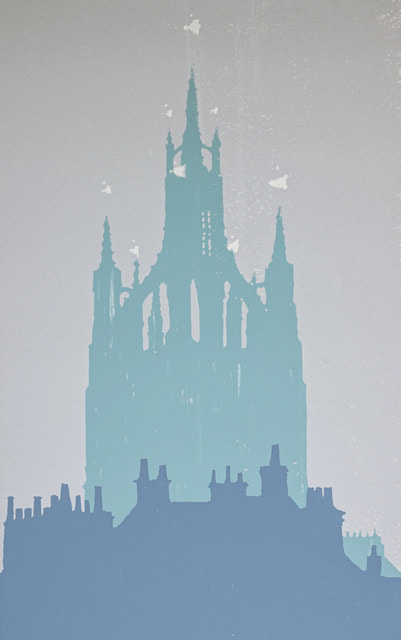Newcastle Cathedral by Ian Scott Massie
Reduction Screen Print - Edition of 12
16" x 12" Mounted size - 11" x 7" Image size
Available: unframed @ £119
To shop, please click here
16" x 12" Mounted size - 11" x 7" Image size
Available: unframed @ £119
To shop, please click here
THE GENERAL STRIKE: CRAMLINGTON
Many years ago, I met an old miner in Birtley, County Durham. He wanted to tell me of his life underground, where he’d started at the age of 14, and especially of the police brutality he’d witnessed during the General Strike of 1926. The strike was a bitter affair. Initially a dispute over longer hours and lower wages for mine workers. It became a much larger issue, which soon included railway employees and a total of 1.5 million workers. Set against the strikers were the police, the army, non-union employees and volunteers, most of whom were politically conservative and determined that Britain should not succumb to a revolution by the working class as had happened in Russia nine years previously.
One particular story sums up the desperate mood of the time. At Cramlington in Northumberland, a group of miners decided to take action. Their families were starving, they were threatened with eviction, and they must have thought: “What have we got to lose?” Their plan was to halt the Flying Scotsman and raid the buffet car for food.
The East Coast Main Line takes a curve as it passes Cramlingtion and this may have saved many lives. The miners removed the bolts from two “fishplate” connectors and took out a length of rail. When the express steamed into view it came off the rails, but, because of slowing for the curve, stayed upright. Of the 500-600 passengers none were injured. However, in a cruel twist of bad luck, the train did not include a buffet car.
Four miners were sentenced to a year in prison. The strike eventually failed and revolution was avoided. All the appreciation for the hard labour and sacrifice that had kept the home fires burning during the First World War was lost. Instead the seeds of discontent were sown, which would bear fruit again and again, until the mining industry was finally dismantled by the Conservative government of the 1980s.
One particular story sums up the desperate mood of the time. At Cramlington in Northumberland, a group of miners decided to take action. Their families were starving, they were threatened with eviction, and they must have thought: “What have we got to lose?” Their plan was to halt the Flying Scotsman and raid the buffet car for food.
The East Coast Main Line takes a curve as it passes Cramlingtion and this may have saved many lives. The miners removed the bolts from two “fishplate” connectors and took out a length of rail. When the express steamed into view it came off the rails, but, because of slowing for the curve, stayed upright. Of the 500-600 passengers none were injured. However, in a cruel twist of bad luck, the train did not include a buffet car.
Four miners were sentenced to a year in prison. The strike eventually failed and revolution was avoided. All the appreciation for the hard labour and sacrifice that had kept the home fires burning during the First World War was lost. Instead the seeds of discontent were sown, which would bear fruit again and again, until the mining industry was finally dismantled by the Conservative government of the 1980s.





